McKownville before the mall(s) - local businesses and shops
before about 1960
1. 19th and early 20th century
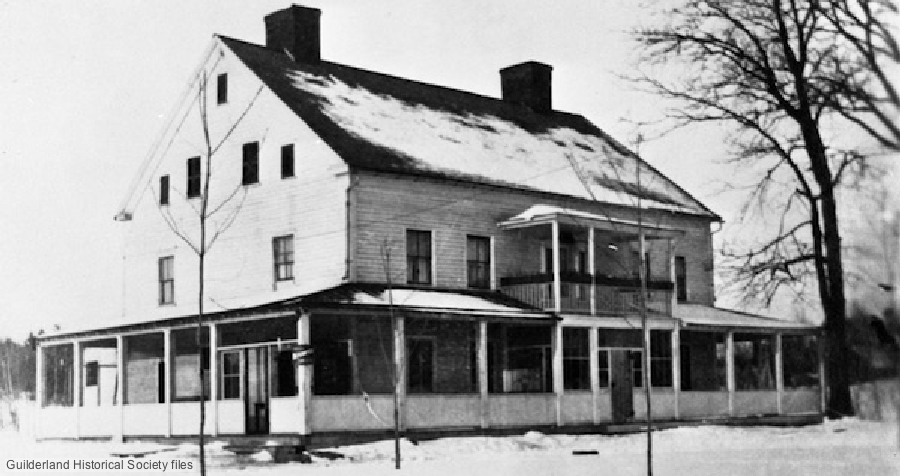
McKownville began as a business, that of William McKown's hotel,
tavern, and hostelry, built in 1793.
This had extensive stockyards, barns, and a slaughterhouse nearby,
and also included a local farm, mainly for hay to supply the horses
of the Great Western
Turnpike traffic, although McKown also had another farm on
better soil down in the Normanskill valley to the south.
The McKownville post office, located in the McKown Hotel, was
started in 1862 and operated until 1905, with Rural Free Delivery
from Albany after that date.
Another smaller hotel was located near the Normanskill Road (now
Church Road) intersection, west of where the McKownville
Methodist Church would be built in 1866, marked on the 1805
Randel map as George Brown, on the 1851 and 1854 maps as Steers
hotel, and as Mrs Beaver's hotel on the 1866 map. According to Fred
Abele, this structure was built in 1803. It survived until it burned
down in 1936.
Most other inhabitants of McKownville before about 1900 were small
farmers, and a few in other businesses providing services to the
Western Turnpike traffic; two blacksmith and wheelwright shops are
marked on the 1854 Gould map, one near the Albany city line, the
other next to Steers hotel.
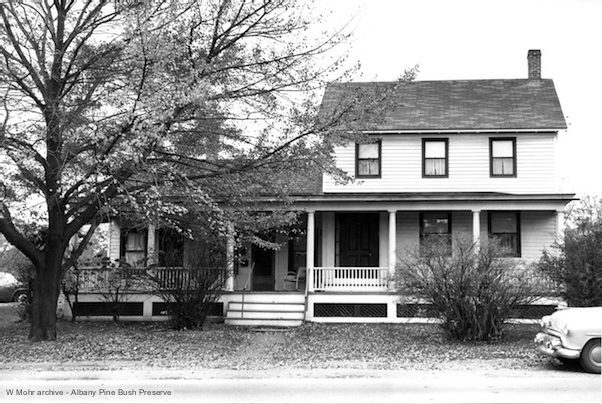
There was a local doctor, Dr. Thomas Helme, who built his house near
the Krum Kill in 1834, and his son also Thomas who followed
him in the profession. The younger Dr Helme died in 1921. The
Helme's had a 20 acre farm behind the house, which supplied the farm
stand operated there by Dr. Helme's widow, and continued by her
daughter Jennie into the 1950's.
Aaron Jennings was another of the small farmers in McKownville. His
house and farm was near the present Guilderland-Albany
boundary, replaced before 1930 by the gas station at 1227
Western Avenue. In the 1925 census he is listed as "florist",
probably growing flowers for sale in Albany.
For a time, from 1841 until about 1880, there was a brewery in
McKownville, established by William Amsdell, and subsequently owned
by his sons George and Theodore. William Amsdell built a substantial
brick house in McKownville in 1840 which still stands at 1188 Western Avenue,
although located in the City of Albany after annexation in 1916. The
sons established a brewery in downtown Albany starting in about
1854; they moved into the city, and that brewery became a much
larger and very successful business. After their father died in
1864, the McKownville brewery appears to have operated until at
least 1876, but may have closed soon after that.
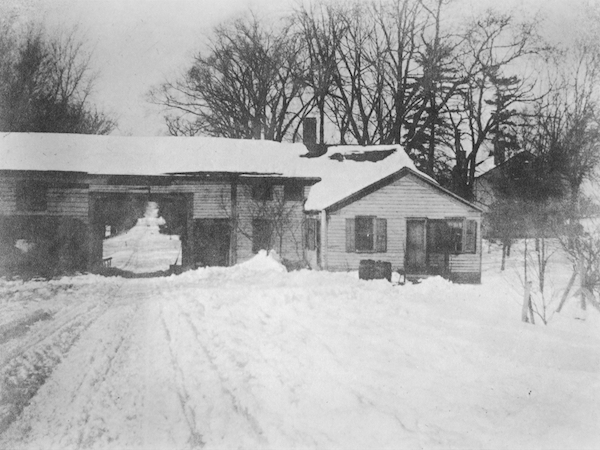
Tollgate No. 1 on the Great
Western Turnpike was originally located in McKownville (also
in the area annexed in 1916), at the present Homestead Avenue
intersection. This gate was replaced in 1849 by one located in the
City of Albany at the 19th Street (now Winthrop Avenue)
intersection.
William J Knowles was the last tollgate keeper of Tollgate No. 1 on
the Western Turnpike. In the 1880's he may have been the first
(horse-powered) commuter living in McKownville, as the tollgate was
2 miles away. Up to 1894, he lived in a house which he sold to the Albany Country Club,
along with the farmland, the house becoming the Club House. The
Knowles family then moved to an existing house still to be seen at 1261 Western Avenue,
built in 1879 by carpenters and builders Andrew Drumm and his son
Henry. Henry Drumm lived in this house until it was sold to Knowles,
but then moved from McKownville into Albany; he later returned to
McKownville to rejoin his father.
Two dairies were operating in McKownville in the late 19th and early
20th century, one owned by Charles Albright who lived in the house
formerly Amsdell's at 1188 Western Avenue,
and the other owned by George Manville, who lived at 1438 Western Avenue
until 1920. Manville's dairy was in the area west of his house, east
of the McKown/Witbeck Hotel lot. A dairy in McKownville belonging to
A.O. Rapp was the scene of a fire reported in March 1924; this may
have been the one previously Manville's, or perhaps another located
near Rapp Road, to which the McKownville Fire District then
extended.
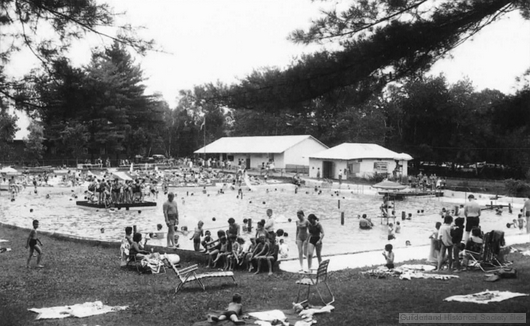
McKown Grove was established by
William McKown in 1896, a park by the lower pond on the Krumkill
west branch, where McKownville residents could enjoy picnicing and
clambakes, swimming, baseball, dancing, and other amusements added
after William J Knowles bought the business in 1926. Knowles' widow
sold the Grove in 1950, but it continued to operate until 1973.
2. 1910-1950
McKownville started changing rapidly after 1907 when William H
Witbeck bought the McKown Hotel and the hotel farmland along Western
Avenue, and motorized transport on Western Avenue started to grow.
In 1910 the Witbecks started their Country Club Highlands suburban
development, and similar development by the Wilbur Land Co. began
about this time on Hillcrest and Arcadia Avenues. In 1911, the
trolley line was opened to Albany from the city line on Western
Avenue, and easy commuting into Albany became possible.
While the building of houses accelerated on former farmland and in
previously uncleared pine barren areas, some small truck farms
continued in areas away from Western Avenue. One of these was an 11
acre plot farmed by Fred Trick and his family on the west side of
Fuller Road until the development of houses on Providence and Mercer
Street started in 1937. Other truck farms worked up into the 1930's
were nearby, east and west of Fuller. A more extensive farm,
belonging to Augustus Ziehm, was located on both sides of
Schoolhouse Road and continued into the 1930's and perhaps a bit
later, but was mostly obliterated by the New York Thruway in the
early 1950's. The barn of Ziehm's farm, refurbished, is in the
grounds of the Woodlake apartments.
Most of the small businesses that opened in McKownville after 1910
were located along the south side of Western Avenue near the city
line. In part this was because the Pitkin-Witbeck partnership put in
a restrictive condition in the deeds of lots they sold in their
Country Club Highlands development, usually "No business or
manufacturing to be carried on and no intoxicating liquors to be
sold", and they also specified a minimum dollar amount for the
residence to be constructed, intending the development to be and
remain exclusively residential, in this time before any zoning laws
existed in Guilderland.
In the area near Hillcrest Avenue, several grocery-type businesses
found a home, catering to the new residential customers.
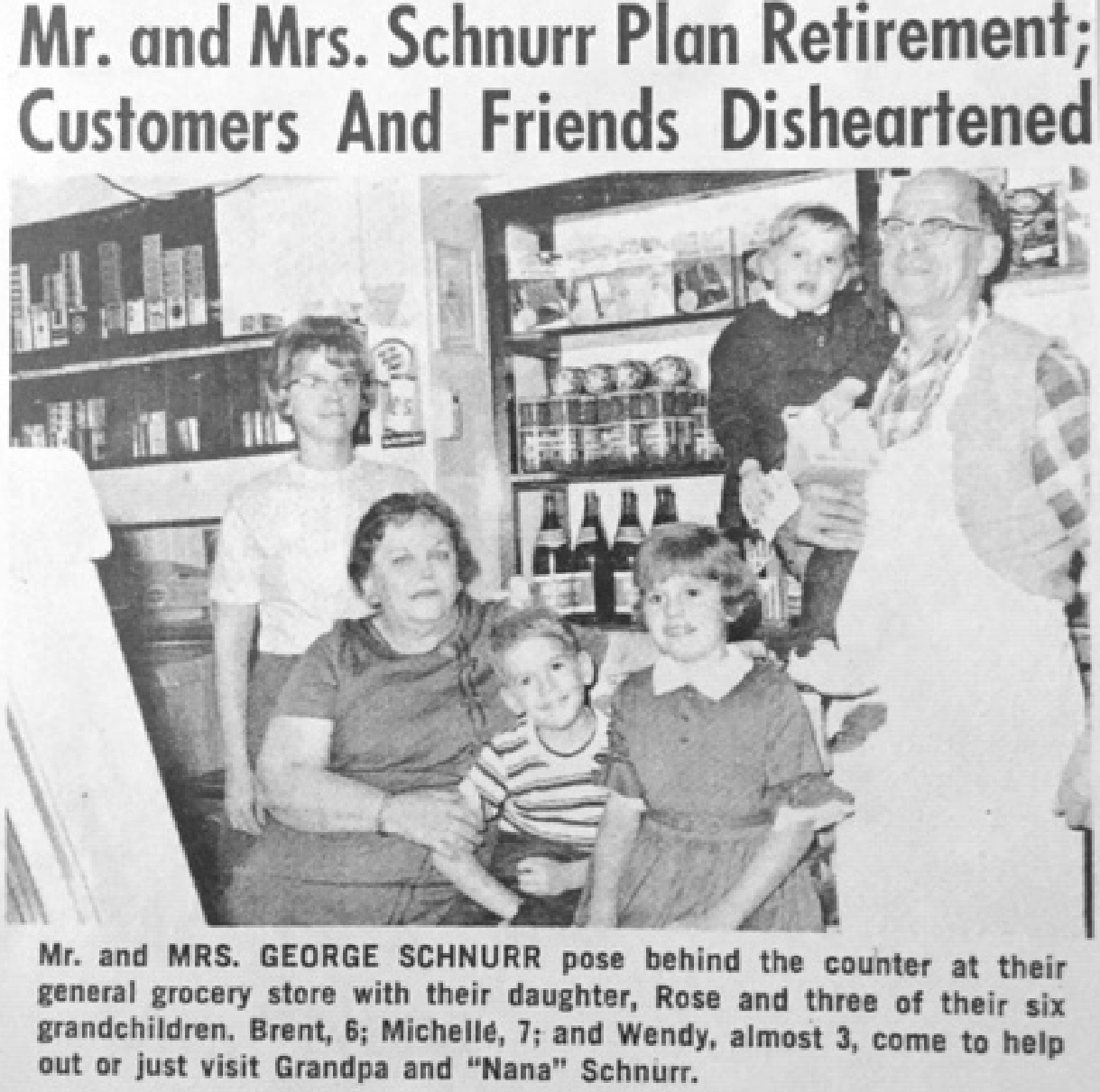
John F Bangert had a meat store at 1234 Western from before 1931,
subsequently taken over and diversified into meats and groceries by
George R Schnurr in 1945. This store closed in the mid-1960's when
redevelopment of this site by Quadrini took place.
(clip from Turnpike Record, v.11, no. 41; image courtesy of Mary
Beth Sharkey)
1232 Western was from 1936-1941 an A&P grocery (The Great
Atlantic & Pacific Tea Company); that business had previously
been since 1931 or before in a building (later replaced) across the
road at 1237 Western.
The Helme's, Carlotta and Jennie, mother and daughter, ran the
Wayside produce market beside their home at 1230 Western
from the 1920's; the Helme children in 1959 sold their property to
Quadrini, who first planned a bowling alley, but then constructed
the motel (first a TraveLodge) that replaced all these small
businesses in 1964.
For a time (~1928-1937), there was also a grocery shop
(Rosenstock's) in the building next to the Country Club Garage, at
1238 Western. This then became Harold Vincent's confectionery shop,
changed to Vincent's restaurant in 1944, and then to Vincent's
Tavern in 1954. The tavern survived until the demolition in the
1960's of the Garage and replacement of both buildings by the Across
the Street Pub and its parking areas.
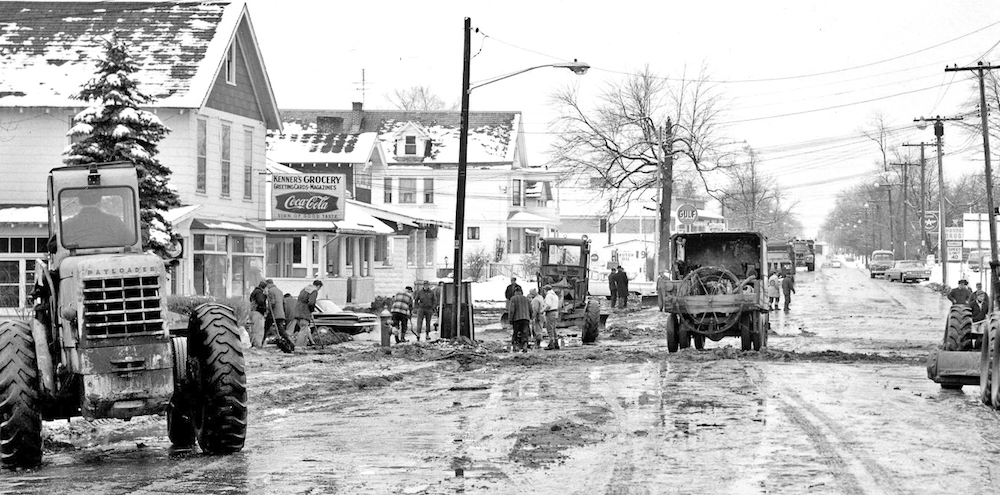
Another small general/grocery store was located at 1200 Western just
across the city line, in operation from before 1931. This was known
as Kenner's Grocery in 1963 (previously King's Grocery in 1960;
Fowler's in 1956; Wilson's in 1931, but continuously a small grocery
store through these years).
Kenners Grocery and view west into McKownville along Western
Avenue, 21 March 1963; clearing the road of debris from the flood
resulting from collapse of the dam at the pond on the University
Campus.
(image from M E Grenander Special Collections and Archives,
University at Albany)
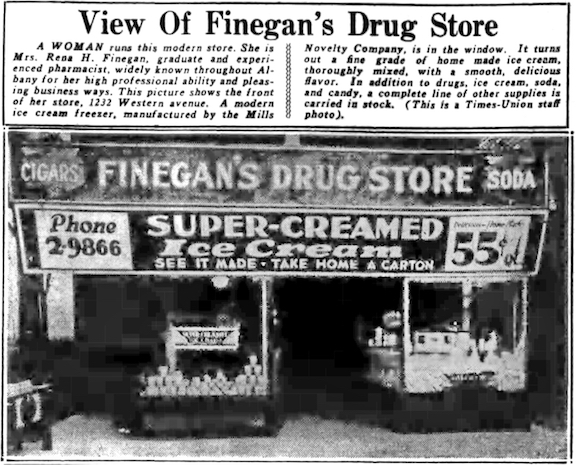
Rita H Finegan ran a drugstore at 1232 Western until 1935 and there
was briefly a drugstore at 1236 Western in 1936-37, perhaps this one
taken over and moved. Rita Finegan returned to 1232 Western in 1942,
and the re-established drugstore became a partnership with Michael J
Hannan in 1945, and he took over the business in 1952. Hannan moved
in 1956 across the Avenue to a newly built store at 1237 Western,
and the pharmacy continued there for many years after.
(clip from Times-Union, 1932; image courtesy of Mary Beth Sharkey
via www.flickr.com/photos/albanygroup/)
From 1956, 1232 Western was occupied by James Sackrider's hardware
store, until the Quadrini demolition.
James Ammenheuser lived at 1206 Western from before 1930. He ran a
business there from 1938-1946 called Capeheart Salon selling
phonographs, records, and radios, and also Studio Shop gifts from
1943-49.
Tusang-Barhydt electrical supplies occupied 1236 Western Avenue in
1939 and stayed there through 1956; the business moved to 1434
Western Avenue and continued there, and became the oldest
continuously operating business in McKownville by far, long before
it closed in 2006.
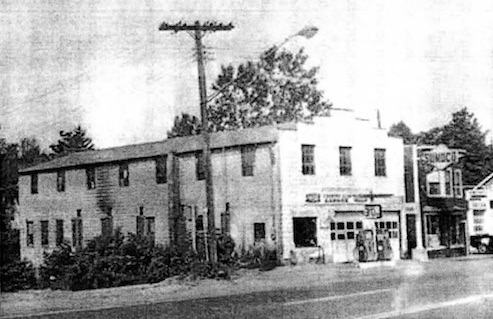
The Country Club Garage,
located at 1238 Western Avenue, started in the early 1920's. Mr.
Oliver Wendell Holmes ran this auto repair and towing business until
the mid-1930's; Peter Lampman bought the business and operated it
until the garage was demolished and replaced in the 1970's by the
Across-the-Street Pub. In 1938 it was selling Dodge and Chrysler
cars, but it was for most of its existence a (large) repair shop.
The McKownville Fire
Department kept their first vehicles in the basement at the
rear of this building from 1926 to 1935. The garage took its
business name from being located near the Albany Country Club; there
is no evidence we have seen of ownership by the Club of this
business.
The Garage also sold gasoline; Sunoco pumps were outside in
the later part of its operation.
There was a proliferation of gasoline/service stations along this
part of Western Avenue in the 1920-50 interval, reflecting the
primary nature of US Route 20 (Western Avenue here) in the
pre-interstate road network. The Sanborn fire insurance maps and the
city directory listings show that in 1933, there were four
garage/filling stations here in McKownville within half a mile of
each other.
Besides the Country Club Garage, these were: Tydol (Flying A) at
1227 Western; Shell Petroleum at 1240 Western; and Thomas W
Cornell's gas station (Socony) at 1254 Western (the site now
renumbered 1414 Western), and there was another one just across the
city line near Homestead Avenue.
By 1951, there were no fewer than seven gas stations between the
Albany city line and Fuller Road. Besides the four above, these
included a Gulf station at 1228A Western, Atlantic (Arco) at 1236
Western, and the Witbeck's gas station at 1480 Western, at the
Fuller Road intersection (brand unknown, but was sold and became
King's Shell from 1954).
In March 1936, the McKownville Improvement Association minutes
record a recommendation to the Town Board to restrict the number of
gas stations; this may have been one of the issues that from the
mid-1940's prompted the Association repeatedly to urge the Town to
establish zoning regulations, and a Planning Department, which did
eventually happen in the early 1950's.
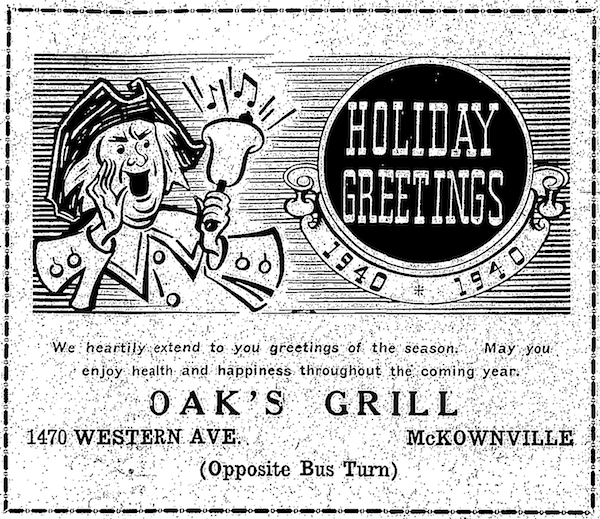
In the section of McKownville near the Fuller Road intersection,
Charles Ebel was the lessee of the remaining Witbeck/McKown Hotel
barns and outbuildings after the
1917 fire destroyed the main hotel building. One of these was
converted to a tavern and grill, known as Oak's Grill, as Ebel had
Oak for a nickname. Ebel also sold block ice up to 1935. He is reputed to have kept
his tavern liquor supplies in his chicken house! He sponsored, and
perhaps participated in a local
baseball team, Oak's All Stars. The Grill burnt down in 1941,
and did not reopen.
The former hotel yard was also used, until 1950, as the stop and
turn-around for the United Traction Co. Western Avenue bus
service, instituted in 1925 after some lobbying by the
McKownville Improvement Association. From 1950 until 1960, the bus
turn-around was located across the road, in the then unbuilt lots of
1467 and
1471 Western (now medical office buildings). When Stuyvesant
Plaza was opened in late 1959, the end of the bus route was shifted
into the Plaza.
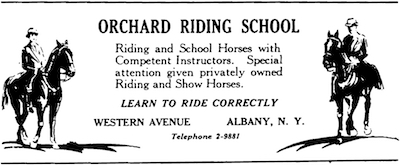
About 1939, the veterinary practice at 1506 Western Avenue was
started, and has continued since, much of the time as a business
known as Albany County Veterinary Hospital, owned by Milford E
Becker. Sometime after 1940, the adjacent then residential property
at 1512 Western Avenue started to contain a kennels business,
Bra-Far Kennels, owned by William Hellerbrandt, which continued at
least through 1961. For a short time, only listed in the 1932 and
1933 editions of the Albany city directory, the Orchard Riding
School occupied the area where the office building and parking lot
of 1450 Western Avenue are situated.
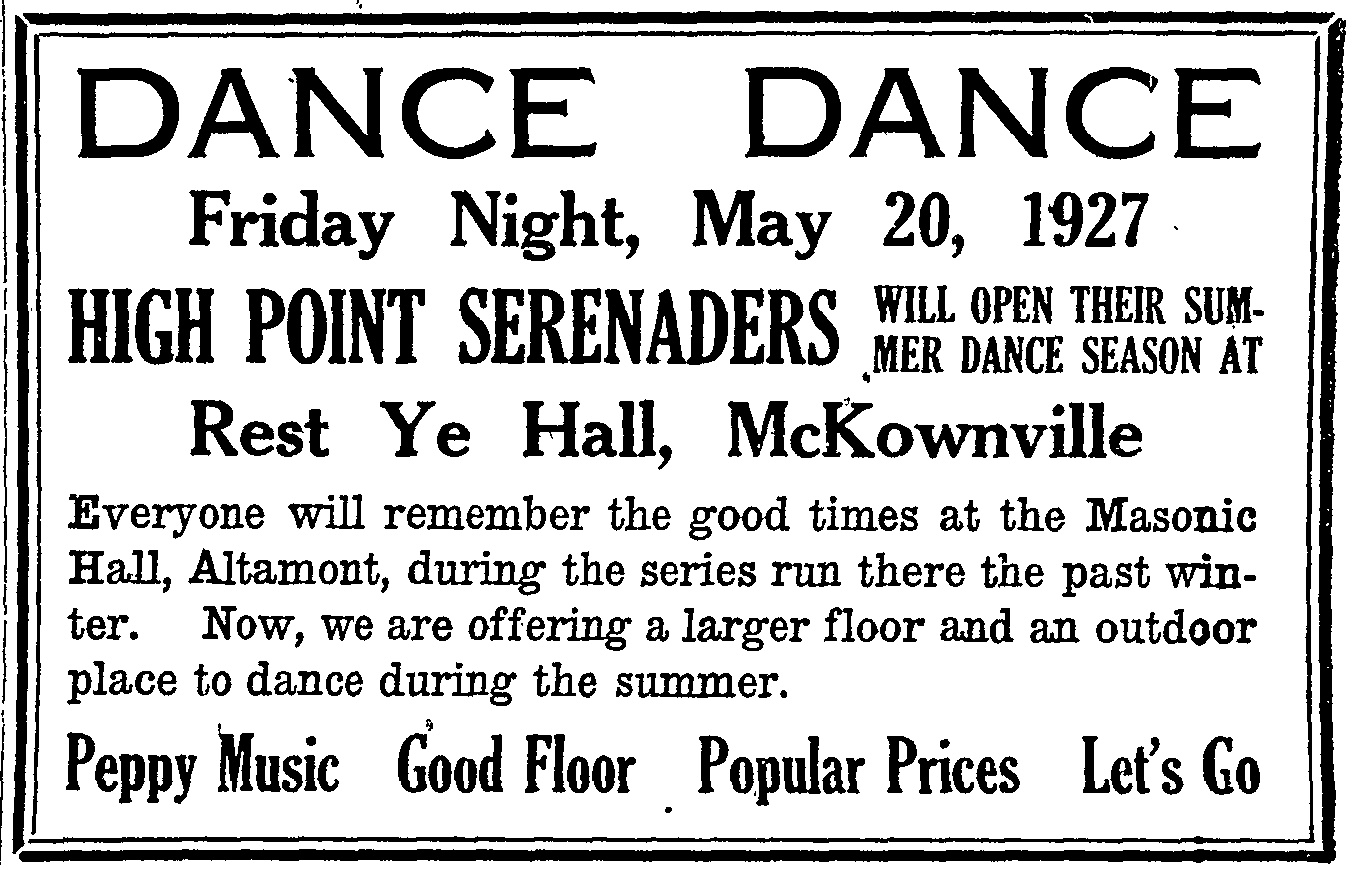
Before the Westmere Fire District was established, in 1937, the area
out to the Johnston/Rapp Road intersection was covered by the
McKownville Fire Department and regarded as part of McKownville. The
Rest Ye Inn dance hall and restaurant (Rest Ye Hall before 1930),
located on the eastern corner of Johnston Road and the Western
Turnpike, in some instances advertised itself as in McKownville up
to 1938.
The Old Tavern located just west of the McKownville Methodist
Church, built about 1803, was last owned by Clark Gibson at the time
it burned in June
1936, when it was being used as "a dining, dancing, and
swimming resort". Like McKown Grove, the swimming was in a pond
(Church Pond, or Harrington's ice pond) formed by a low earth and
wood dam across the Krumkill stream behind the old hotel.
Some doctors and dentists also chose buy residences in McKownville,
and some of them to practice there. It was common in those years to
make house calls, and also some consultations at the doctor's home,
but generally the house was not used intensively for the practice.
The doctors living in McKownville from the 1920's onward included
Morgan O. Barrett [at 1429 Western, until 1950]; Orvis A.
Brenenstuhl [at 2 Glenwood until 1943]; and W. Brandon Macomber
[1430 Western from 1936 into the 1960's].
Dentists living in McKownville included George H. Proper [at 3
Norwood, from 1930 into the 1960's] and Edwin H. Gale [at 1455
Western, until 1946].
All these doctors and the dentists had professional offices in
Albany.
3. 1950-1960
In 1948 the daughters of William McKown sold their house at 1436
Western Avenue and the property which also included the lot now 1434
Western Avenue. The buyer promptly had the house moved away from
Western Avenue to become 1 McKown Road, and
the brick garage and gas station built in 1950 where the house was
at 1436 Western Avenue. This was an Atlantic Richfield franchise
business into the 1960's. The conversion of this attractive
residential property to (lets be blunt) an ugly commercial building
and crowded parking lot was done just before the Town of Guilderland
introduced a zoning code. One might hope that such an intrusion
would not now be permitted. The lot was rezoned in 1985 to a less
intensive category, so the building and function are non-conforming
to the present zoning code, and are therefore recognized as an
unsuitable use of this property in its present context.
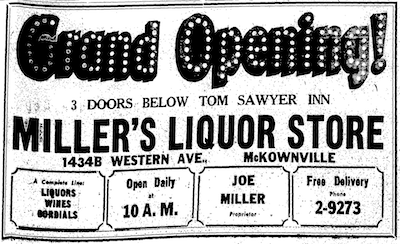
The storefront building at 1434 Western opened in 1950, and has
contained two to four small businesses at any one time since then.
Crouse Refrigeration was located here 1950-1960; Master Cleaners
1950-54; Westlyn Hardware 1951-55; Freibel Furniture 1954-56;
Miller's Liquor 1955-after 1961; Tusang-Barhydt electrical supplies
1957 to 2006 (by far the longest-running occupant). This building
and lot was also rezoned in 1985 to a less intensive category, and
is also non-conforming in the present zoning code.
A new business started at 1244 Western in 1958, that first styled
itself New Yorker Beauty Shop but was quickly made to change the
name to New York Hair Stylist. This local business operated for a
substantial time after 1960, the property eventually being sold to
become chain fast food Taco Pronto, and then chain coffee Starbucks.
Another instance of zoning creep to heavy commercial use of the site
of a former residence, right next to the residential area to which
it formerly belonged.
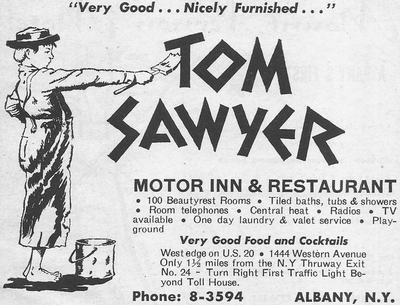
The Tom Sawyer Motor Inn at 1444 Western Avenue was another product
of this time, constructed in 1950 on land sold by the descendants of
Benjamin F Witbeck, used as a baseball field for the local teams
through the 1930's and 1940's, and known then as Witbeck Park. An Elmira
businessman, who had built there a smaller motel with the same name,
taking the name from the association of Mark Twain with Elmira,
financed the construction of this 100 unit motel and restaurant just
two years before the New York State Thruway would remove much of the
long distance traffic from US Route 20. Perhaps because the Albany
area had for many years a quite limited number of hotels, and
especially of those with accessible and free parking, the Tom Sawyer
survived for a long time, until being replaced in 1995 by the
medical offices and hotel now on the site.
The dentist office at 1484 Western, and the Christ Lutheran Church
adjacent at 1498 Western were built in 1956-57 on formerly open land
of the McKown Hotel Farm, and also sold by the descendants of the
Witbecks. Dr. Wesley Van Loan, the dentist who first occupied 1484
Western, had married Emma E. Witbeck, the daughter of Benjamin F.
Witbeck. As Emma Van Loan the real estate dealer (dba McKown Farm
Realty Corp at this address), she was the nominated seller of most
of the remaining Witbeck land in the 1940-1960 interval. Besides
those mentioned on this page, property sold by her included the
McKownville Reservoir to the McKownville Water
District in 1949.
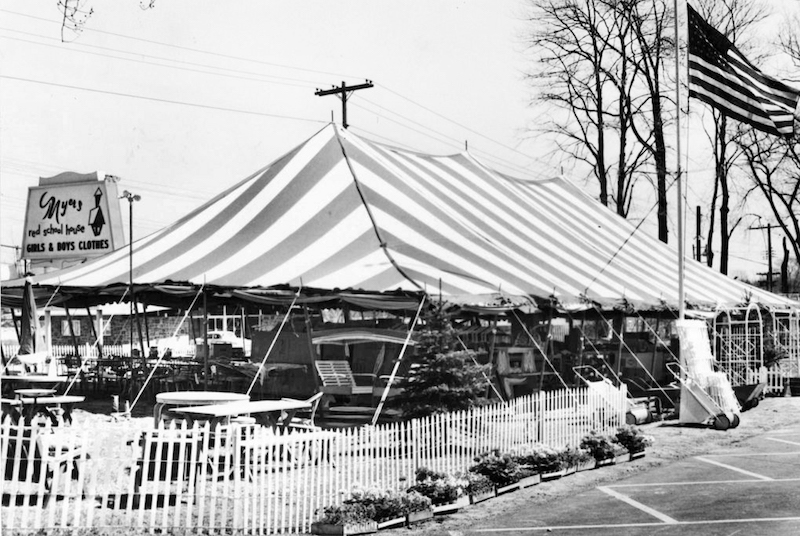
To the west, the McKownville
Schoolhouse became unused after school district consolidation
in 1953, and was sold in 1956. It became a John G Myers store, the
Red Schoolhouse store, for a few years, then briefly a beauty salon,
and then became unused again in the early 1960's. It was badly
damaged by fire in 1973, and then demolished.
Outdoor part of John G Myers Red Schoolhouse store, Western
Avenue and Schoolhouse Road
(image from www.flickr.com/photos/albanygroup/ -
original source not identified)
The first moves to build the large shopping center of Stuyvesant
Plaza began in 1955, with purchase of the land (most of it also from
the Witbeck family descendants), and the successful petitions by the
new owners to change the zoning from residential to business. It
took until late in 1959 for the main shopping portion to open, with
the Howard Johnson restaurant near the Fuller Road intersection
being the first business in it to open, a few months before the
rest. [clippings from
the Altamont Enterprise 1955-60]. The Plaza with its many
shops, including (for the time) a larger supermarket, greatly
changed McKownville. However, the closure in the late 1950's and
early 1960's of a number of the small businesses on Western Avenue
near the Albany city line appears mostly caused by sale of those
properties to non-resident developers having large plans not
compatible with retaining the existing locally-owned enterprises.
return to McKownville history page
return to McKownville Improvement
Association index page













